Photo
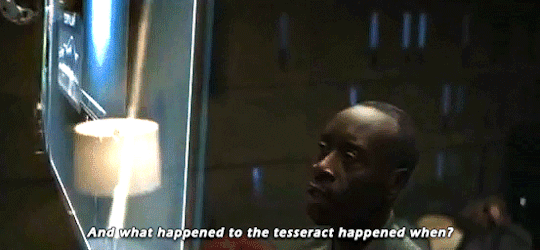
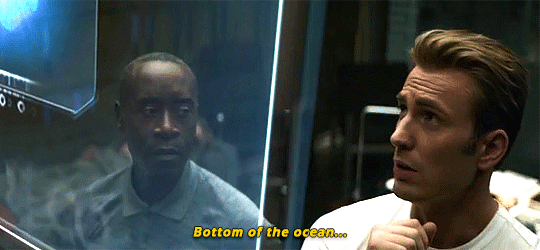
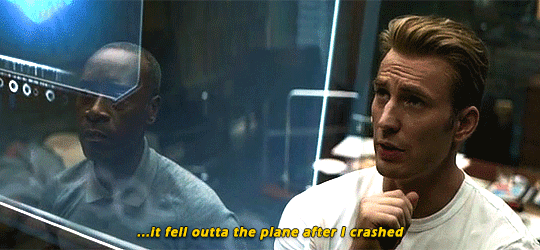
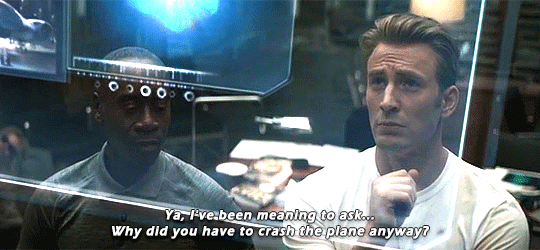
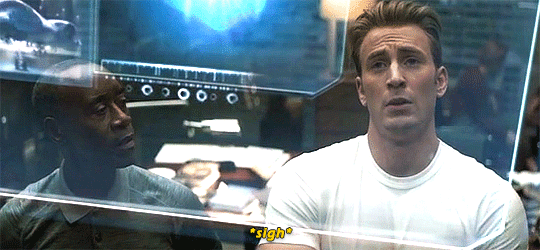
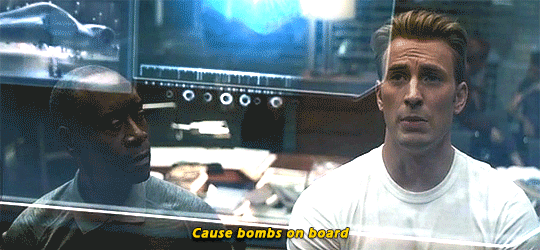
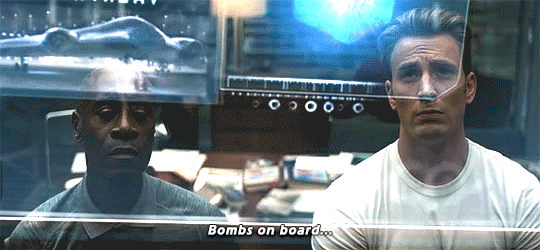
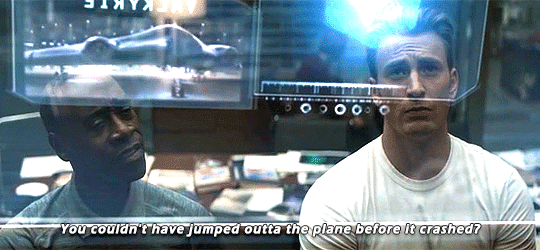
★ Important questions ★
Steve Rogers and James Rhodes | Deleted Scene | Avengers: Endgame
20K notes
·
View notes
Text
Ya know, this blog has kinda turned into a mcu critique blog and I'm okay with that
0 notes
Text
I’m gonna illustrate to you the Thanos-problem not so quickly.
The studio went to Kenneth Branagh in 2010 and told them they want a villain as good as Magneto for their Avengers film.
And almost 10 years later the MCU wanted to write an interesting, political villain called Thanos for Infinity War/Endgame.
Now, when Kenneth Branagh got the (really annoying) custom-order for a good villain, he didn’t look at the villain the studio liked and copied him. Instead he had the brains to write Loki as a character. With his own personality traits, qualities, quirks, a unique backstory that appeals to Branagh’s strength as a writer, whose origin story can be used and re-used in future films and plots, who has unique and adaptable strengths and weaknesses and who is played by an actor who is really good at playing roles like that.
Meanwhile Thanos is just…going through the Killmonger/Loki/Magneto motions of: political villain: ✅ tragic backstory: ✅ destruction: ✅ big baddie speech ✅ — but there is no heart to any of that, no sense of detail, no moment for him to shine no personality.
And you know (I really tried to stop myself from adding this) in the 90s we had this flood of dark, gritty anti-heroes with their giant guns and ten thousand pouches. And some of them like Cable were really good while later characters became pale imitations of Cable (think of that famous video of Liefeld inventing a character and he just draws Cable number 8948320 and his backstory is that he’s a cyborg) and all those rehashes of the Killing Joke. And in the end they all lost track of what made these characters good in the first place.
And in the late 2000s and early 2010s we had this wave of young, hip, funny for the lulzs supervillains who just had quirks and no reasons and personality and in the end, basically nothing of substance remains of any of them - an epidemic starting with Heath Ledger’s Joker but were later replaced with young men in suits who were also kinda pop-culturally - ironically Leto’s Joker hopped onto that bandwagon like 9 years late with a starbucks
And I understand why in the last few years, political villains have entered mass-production, but a villain like that doesn’t work unless your writing challenges their ideas. Okay lemme give you another example: Since the (in)famous Far Cry 3 with its very 2012 villain quirky-crazy-Joker-y villain Vaas we now had Far Cry 4 playing in the land of a slightly quirky fashionable young man dictator and Far Cry 5 and New Dawn with an evil Christian cult right in the US.
The transition from early 2010s to late 2010s is obvious but - these are video games and by the time we fight the final boss, we have automatically actually spent a lot of time in their respective worlds. We know why these are horrible people. We are challenging their methods and ideas already when we encounter them. In the MCU, we see Killmonger actually rule over Wakanda and we know while his ideas are good. his methods aren’t - while at the same he challenges Wakanda and forces T’Challa to accept that his father was not perfect. Each time we see Loki rule over Asgard, imperialism is challenged - in the first time when he actually attacks Jötunheim (thus executing exactly the things he had been taught his entire life) and by not intervening in the colonies in Ragnarök.
But, you are going to say, Thanos ideas are challenged! We see that people are sad that he killed half the universe! - and I mean yeah, but I didn’t need to watch the movie to know that people would be sad. Instead, everything happens exactly as you expect it would. All these previous examples were interesting because we wouldn’t know what the villains would do and how it would affect the population. Also the final notion - that the universe would eventually be better of if half the universe was destroyed, remains unshaken and unaddressed.
And honestly, their attempt to make Thanos likeable or understandable might be the huge problem of the film. Thanos as a morbid, unlikable killer who’s in love with death works because we don’t need to relate to him for that. We don’t need a connection. Many good villains are absolutely detestable. You can do a lot not by making them seem sympathetic (which is almost impossible with villains like Thanos anyway) but you can make them interesting to the audience-
let’s talk about villains who are absolute giant assholes but I like them:
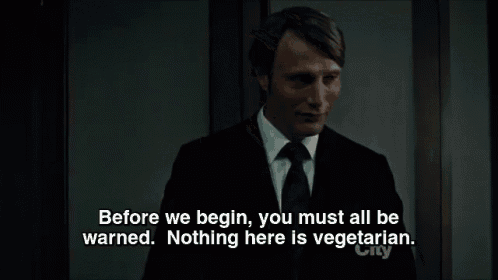
Yeah him <3 You remember the first season of Hannibal? As members of the audience, we know who Hannibal is before we even start watching. Hannibal Lecter is one of the most famous villains there are. In the movies, he’s arrested in Red Dragon right in the first scene - there is never any doubt about who he is. But in the show, he’s yet an active serial killer and working with the police. The police that solves his murders. The police who doesn’t know that he’s the killer. The killer whose name literally rhymes with cannibal and who makes cannibalism puns. There were hundreds of memes about how fucking frustrating it was that the police always just walked right past him.
That was the thing: We, the audience, knew something the characters didn’t. Like in a horror film when we know the killer is hiding behind the door and the main character doesn’t. You want to fucking scream at the screen in frustration.
Okay what does that have to do with Thanos? Imagine all those glimpses and we saw of him in previous movies would have presented him in a likeable light. Imagine if his disciples were actually seen gaining people’s trust or if people in GotG would actually casually mention “oh Thanos will fix this, I heard he has a brilliant plan” or he tried to convince them that there was a huge famine coming. It would have been so frustrating to see people trust him because obviously everyone who reads the comics would know that Thanos is bad news and if we saw people actually trust him? maybe actually give him Infinity Stones to fix the universe because he’s the only one who can use them? Fucking rude.
Reveals :)
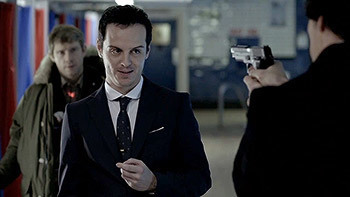
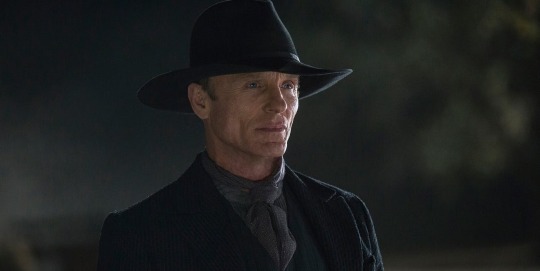
I guess I don’t have to tell tumblr who the first guy is but a quick rehash: In season finale of Sherlock, a guy who appears in one scene as the girlfriend of a colleague of Sherlock turns out to be Moriarty.
And guess what? It absolutely doesn’t matter one single fucking bit that Moriarty is the lab guy. And the big reveal doesn’t matter because we’re not given any of the clues. He might as well have been the mailman. Now, the Man In Black from Westworld however? That was a huge reveal. (Major spoilers if you haven’t watched it but I’m keeping it vague). We saw the Man In Black commit the worst crimes imaginable throughout the first season of the show, he killed hundreds of people without remorse. And in his defence, we thought that he thought it was all a robot theme park. Except? We find out that he’s actually the older version of one of the main-characters who absolutely saw robots as people once and evn protected them and loved one. This was both a horrifying reveal, an origin story and it made his crime even worse. That’s good villain-writing.
What does that have to do with Thanos? - Technique. Just how the reveal was written has a huge impact. Imagine if there had been no mention of Thanos at all until Infinity War - and the characters were actually forced to figure out who brought Loki to Earth, who supported Ronan, who attacked Asgard. Maybe you catch some glimpses of his disciples and maybe you get to hear the name of one of them at the very end or Loki even whispers “Thanos” in Thor’s ear before he dies and he as to figure out what that means. Make us work to get there.
Relevance!
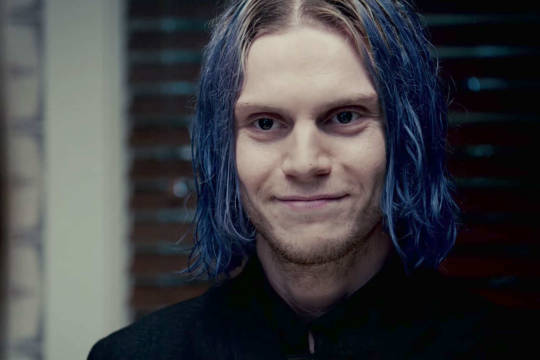
Now, they wanted a political villain, right? AHS Cult gave as a political villain who is absolutely detestable every step of the way. But the reason he was scary and interesting is because…it was relevant af. Every word he said, every political opinion he expressed, the way he staged attacks on him by migrant workers and spread fear in his community - that rings very close to home right now. I can get why someone would say you can’t do the same in a Marvel film, but Sci-Fi has always been a projection screen for political subjects for decades now. Star Trek has been doing it since the 1960s and if they had actually committed to making Thanos allude to actual political slogans of today, he would have been way more relevant.
Dynamics (aka how to make someone likeable without condoning their actions)
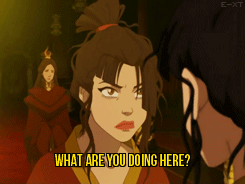
On my main, I made a post once about Loki and Magneto and how having, forming and developing relationships helps to flesh out a character. In short: We learn to understand them. We see them grow. We see (ideally) how they learn from encounters and how it shapes them. Now we are entering the realm of likeable again with Azula, because what made her a brilliant villain was not her brilliance or her abilities (they made her a great opponent though) but her motivations. The more we see her family, the more we learn that she, too, is a victim of a dysfunctional family. She allows a whole new perspective on the royal family. That scene where she tells Ozai that he ‘can’t treat her like Zuko’? - those were ten fucking books written in one line. Her descent into paranoia basically rewrote every scene of her in the past and is also a reminder that she’s 15 and yes, of course, she’s a victim. She’s a child fighting in a war.
How many meaningful relationships does Thanos have? He’s quite fond of Gamora I guess? Less fond of Nebula? There was an embarrassing attempt to create a connection between him Tony. Now, remember that in the comics, Thanos is someone driven by love. He loves death - that’s the relationship that drives him. It’s important that there is a face to everything. Show me Thanos family, show me his homeworld. Show me his previous desperate attempts to save the people he loved and how he was held back and driven to more and more desperate measures. Show me how he finally gives in and wants to destroy everything.
“show don’t tell”

I’m going to argue for a Thanos solo movie now :) (kinda)
Okay I feel kinda compelled to put David in this when I’m already posting this on my rp blog but also a) I love him and b) shut up. short summary: David was created an android that is programmed to serve humans. He grows to resent them more and more, especially because many of them are petty and abusive towards him until in the second film, he just wants them dead.
Now in his first scenes of Prometheus, we see him alone on the ship while the human crew is in cryosleep. We see him eat, play basketball, ride a bicycle, watch people’s dreams. He also watches Lawrence of Arabia while dying his hair to look like him and quotes the above sentence several times just before the rest of the crew wakes up.
It’s a tiny sequence in the film but we learn various things about David: He’s vain, he does things he - as a robot - doesn’t have to do, he identifies strongly with a man torn between two cultures, he has a lot of fun when he’s alone, he habitually spies on people, he is feeling pain in some capacity and he associates it with humans. We learn all of that in those few tiny moments.
compare all of what we learnt in this short sequence to what we know about Thanos. After seeing him in…I think three films by now? And having people talk about him in even more? With literally every character I listed now (excluding Moriarty bc he’s a negative example) we know what drove them to do what they did. We know their pain. We know them. Even if the things they are cruel because here it comes:
They are a Story.
And Thanos is a plot device.
or to quote fellow tumblr user hackedmotionsensors: I’ve never liked Thanos because hes like a video game villain. Like he’s the annoying equivalent of finding the final boss in a FF game and its just a giant head or something stupid.
6 notes
·
View notes
Text
and now the Bigger Issue™:
the MCU writers went and thought: Ok fans like villains with social criticism like Killmonger, Magneto or Loki and they gave us Thanos without giving him any interesting backstory or any traits that might make him fun or likeable. (re: my last post) Oh, and they also admit that they told Kenneth Branagh that basically custom-ordered a villain as good as Magneto from him to be used in Avengers 1. I mean they got lucky with him KB that he actually did put in the effort to make Loki a good villain. But it’s still symptomatic of The Disease.
They could have made Val becoming Queen a story of its own with her at its centre or at least given more screen time to her leading the Asgardians already in those five years but instead its Thor walking up to her like “You’re it!”
They saw Logan and thought: cool so audience surveys say dads connecting with their daughters before dying increases the sads by 37.6 percent gotta ride that train without giving the audience any of the complex, ambiguous relationships that made Logan so special. (And yeah they admit that Tony’s daughter was inspired by Laura and that they did it to make Tony’s death more dramatic.)
They could have built up literally any relationship for Steve in the present, any life he might want but they have put zero effort into that or if his story arch had moved in any particular direction but they didn’t so they had to take him back to Peggy.
They saw that people celebrated the MCU TV shows and Deadpool for having actual canon LGBTQ presentation in their stories and the actor’s like Ryan Reynolds openly stating that for example Deadpool is pan and they gave us 1 gay Russo scene about 1 guy we don’t know talking about one Buried Gay and call it representation
I don’t have to say anything about Clints family morgana that appears and disappears in random intervals except - tell me three things about each of his family members.
They also saw people liked female superheroes and gave us 1 group shot of a bunch of women who had no emotional connection to each other or backstory together and called it feminist after more than enough scenes of just guys a) working together b) having an emotional connection and c) advancing the plot.
also they literally ripped off material from Miles Morales’ Spider-Man and gave it to Peter Parker.
And very often these things were central aspects of the original story they came from where they were allowed to feature prominently while the MCU just throws them as a tiny ornament at an over-decorated Christmas tree and wonder why it doesn’t have the same effects.
*(Oh and after waiting for Wonder Woman to be successful before making Cap Marvel and cannibalising Dark Phoenix for Cap Marvel and editing Brie Larson thinner, not giving their reaccuring female characters a film in case CM flops, making the catual
5 notes
·
View notes
Text
I've said that everytime I watched this scene. They tried to make the suit of armor and it failed.

@teameveryonebutironman I’m not gonna comment on someone else’s post but....isn’t this literal, word-for-word Hydra rhetoric? The dismissal of “precious freedom” sounds very Hydra to me
339 notes
·
View notes
Note
I read your reply on a marvel post and I don't want this to sound rude or aggressive or anything, but what did you mean by 'disability erasure in “merging” the Hulk and Bruce.' I'm genuinely curious because I've never heard of anyone having that opinion.
Oh hello! So, one of the reasons I love-love-love Bruce Banner and the Hulk is because of the representation of trauma and mental illness. Bruce Banner is diagnosed with DID (disassociative identity disorder) in the comics, and it’s fair to say this is true to his portrayal in the movies as well. Bruce has had an incredibly difficult and traumatic life - child abuse, his father beating his mother to death, trying to blow up his high school/commit suicide in the comics, and even trying to shoot himself in the MCU. On top of all this preexisting trauma is the medical experiment that irradiated him.
The Hulk is a product of the post-WWII fear we lived in as a society. Nuclear power could be a good weird (like Spider-Man), or it could make you into a rampaging monster. As someone who studies the superhero genre and disability within it, I think it’s safe to say Bruce in the MCU has DID: the Hulk is the “protector” identity who takes over when Bruce’s life is in danger - or if he gets triggered and feels out of control (“don’t make me angry”). Because of comics science bullshit, the Hulk is a physically different person than Bruce Banner - not only is he 9ft tall, green, and so strong he can break the world, his face is shaped differently. His hair is cut/styled differently. Comic science bullshit gives us an opportunity to see the Hulk as he is: NOT Bruce Banner. Psychologically, the Hulk’s defining feature - his strength/indestructibility - comes from child!Bruce’s desire to protect himself and just be strong enough to protect his mother: the Hulk is the strongest there is.
We see a lot of this in the 2008 The Incredible Hulk, a movie that I love beyond words. Yes, Bruce’s situation is complicated by the fact that he’s hiding from Thunderbolt Ross, but he’s living a life very familiar to people struggling with mental illness. He’s isolated, but maintaining a routine; he’s learning to defend himself but also manage his physical response to his triggers; he’s meditating constantly and keeping a log of how many days he can go without losing control. His life is defined by trying to get rid of the Hulk - or, in disability terms, to “cure” himself of DID. This is a perfectly reasonable thing to want, especially if your alter is causing so much damage (especially to those you love, shoutout to the forgotten but much beloved Betty Ross). Unfortunately Bruce lives in the superhero genre, and General Ross wants to use the Hulk as a weapon, which ups the stakes.
That movie follows a man made homeless, naked, and begging by his mental illness across two continents. He wants to go back to the way life was before. He wants his lab, he wants Betty, he wants to stop hurting people. He’s plagued by guilt and flashbacks of events that happened to the Hulk. His metronome for meditating reminds him of the initial experiment gone wrong, and the associated fallout. He collapses in the shower because the showerhead spraying water looks like a cannon spraying bullets.
Because of Superhero Drama, Bruce eventually realizes that the Hulk is the only one who stands a chance against the Abomination, and comes to the conclusion that he will sacrifice himself to the Hulk - possibly losing himself forever - for the greater good. The Hulk takes out the Abomination and runs off; later we see Bruce in a very desolate cabin in the British Columbia. He’s exercising, he’s meditating, and he’s working on his mental health in that he’s gone so long fearing the Hulk, trying to kill the Hulk - who is basically a superpowered toddler desperate to protect the ones he loves - maybe that’s not the healthiest way to approach his DID, and he starts working on some strategies to switch to the Hulk without the triggers - thus working on eliminating the danger of the triggers at all.
Fast-forward to The Avengers. Bruce never names the Hulk in The Incredible Hulk, referring to him only as “it.” By now he’s using a more familiar moniker - “the other guy.” Bruce has not quite gotten over his suicidal intention (which was how the 2008 movie was intended to open, a failed suicide attempt), but he’s trying to make the best of his life by helping others. That’s what he’s always wanted to do. Natasha comes to recruit him, and he keeps his cool through Tony’s insistent attempts to catch him out, finally confiding the loss of control and horror and pain he feels when he’s not there anymore. (DID can feel like blackouts, like being possessed…the MCU seems to go with “blackout with some fuzzy memories in flashback form”). Tony asserts the Hulk saved his life - which would be his primary objective as the protector identity. Bruce scorns the idea, because he does not value his life.
I’ll point out there’s only one accidental Hulk-out here: Bruce and Nat fall two stories and Bruce gets banged up. His head is messed up, and while Nat had the good fortune/training to land fairly safely, Bruce catches the fall on his hands and knees. His wrists and knees are definitely cracked. He tries to hold the Hulk at bay, but with these injuries and a bonk on the head, the protector identity with healing factor is eager to fix Bruce’s tiny mortal body, and he feels threatened.
Fast-forward to “I’m always angry.” I’ve been trying to puzzle this line out for years. I can believe that Bruce Banner is always angry, deep inside. His life is profoundly unfair and agonizingly painful. One of Bruce’s greatest strengths is that he does everything he can to remain kind and empathetic and keep his alter from reigning that anger down on the world. Some fans have speculated that his body is always in a state of high blood pressure, etc; some fans have no idea. I think that after around 8 years of living like this, Bruce has it mostly under control due to his myriad lifestyle changes, but at this moment just allows himself to be just as angry as the circumstances deserve. His pulse skyrockets, and the Hulk punches the Leviathan out of the sky.
This is a complicated issue for him - Bruce’s fear has always been that the Hulk would be weaponized - but as it was with the Ambomination, it was a do-or-die situation. He wouldn’t die, but by god, everyone else would. His morals can take a backseat to saving lives.
Which brings us to his tortured state in Age of Ultron. Bruce loves being part of the team, much in the same way Natasha does. It’s the first real family he’s ever had. What he doesn’t love is Code Greens, which are sometimes necessary, but he’s taking precautions, because that’s what you have to do when you have an unpredictable mental illness: he’s designed Veronica to put him down. He’s worked out the lullaby with Natasha to tell the Hulk that it’s safe and Banner can come back. He has shock blankets and comfy clothes, he has nice headphones for his soothing opera music; he asks obsessively about how the Hulk is in battle; Natasha asks lightly, “When are you gonna start trusting me?” but instead of flirting back, Bruce replies darkly, “It’s not you I don’t trust.” Even able to eliminate most of his triggers, even able to change into the Hulk at will, Bruce feels like he’s got a monster inside him - because he does. And even if things are better than they were, he feels like any wrong move he makes can cascade into innocent people - and people he cares about - being hurt.
We don’t see his fear-vision in AoU; we don’t have to. He lives it. Bruce’s worst nightmare - the Hulk’s worst nightmare - is being out of control in a civilian population. The Hulk has no control over himself while under Wanda’s spell; much as the other Avengers are rendered catatonic, the Hulk is sent into hyperdrive, desperate to get away, get her out of his head. When the spell finally wears off, the Hulk is devastated to see the damage and the screams and the fleeing people and the dust - while he is a savage Hulk, his purpose is protector, and this goes against his nature. The Hulk loved to smash the Chitauri, but he also loved to protect the terrified officeworkers in the skyscrapers and save Tony’s life, something the Hulk felt only he could do, so he did.
But Bruce still thinks of himself as a monster. Not the Bruce part - but the Hulk part. He’s not giving the Hulk enough credit, but how can he? He doesn’t understand the way the Hulk works. He’s never been diagnosed, he’s never been to therapy, he’s never taken medication for DID. All he sees is traumatic flashbacks and disturbing security footage and the equally disturbing reaction of the world claiming that the Hulk in all his violence and savagery is a hero. He spends AoU desperate to run away. To start a new life somewhere (preferably with Natasha), and never have to be the Hulk again.
Natasha’s on board. That’s the tragic part. It’s just that she can’t leave a mission unfinished, so she throws him in the hole and the Hulk comes out. However, the Hulk has a relationship with Natasha separate from Bruce’s - just as Bruce and Betty had a different relationship than the Hulk and Betty. When Natasha calls for the Hulk to come back to her, he reaches for her, not understanding she’s just a hologram - he’s expecting their pressure-point secret handshake. Accidentally, he cancels the call and loses contact with Earth for two years.
Fast-forward to Thor: Ragnarok, which some people say is the best Hulk movie ever made. I think I sobbed through every single time Bruce or Hulk was onscreen, even in the comedic parts.
So let’s break it down: the Hulk has made a life for himself, a life that he loves. He’s valued. He lives in a palace. He has everything he could ever want. People like him instead of fear him (”Earth hates Hulk”). He has no responsibilities, and no guilt. He’s the strongest there is, but there’s no one he needs to protect besides Banner - who’s safe by being not there.
The recorded message from Natasha, however, pulls Bruce back out of the abyss of the Hulk. He’s been gone - like, suspended animation or coma-ish gone. He has no memories. He has had no consciousness. The first thing Bruce asks is if the Avengers saved Sokovia. Then, he asks about Nat - because the last time he saw her, he was breaking her out of a HYDRA base run by Ultrons. His worst fears have been realized yet again. The Hulk was weaponized - for a good cause, and by someone he trusted, but still - and he hasn’t been himself in two full years. Meanwhile, the Hulk has been running a gladiator ring and killing indiscriminately. In suppressing Banner, the Hulk has grown beyond who he was initially, but he’s still an angry toddler, and he still wants to protect people (notice he didn’t kill Thor in the arena, despite the fact that he could’ve easily given him a wound he couldn’t recover from). Bruce is sure that with how out of balance their dynamic has gotten in the past few years, if he changes into the Hulk ever again, he, Bruce Banner, will be lost forever. But he makes the sacrifice to save the Asgardians anyway, and the Hulk rises to the occasion and eagerly helps fight the Fenris wolf and probably would’ve gone head-to-head with Surtur forever. He’s even willing to fight Thanos.
OKAY SO THAT’S UP THROUGH THOR RAGNAROK. HERE IS WHERE I GET ANGRY AT THE REPRESENTATION.
In Infinity War, when the Hulk crashes into the Sanctum Sanctorum, he shrinks back into Bruce immediately. With no explanation of why he can do so after the build-up in Ragnarok about Bruce being gone forever if he transforms one more time. And then Bruce comedically spends the rest of the movie trying to get him to come out and fight. The prevailing fan theory is that this is because the Hulk has never been scared before - he’s never been up against something he couldn’t win. But the Hulk has been scared: he loves, therefore he is scared. He’s scared when Betty is knocked unconscious while he’s trying to protect her from the crashing gunship, and he’s scared when the helicopter catches fire with her inside. He’s scared when Tony falls from the sky and his arc reactor is dark. He’s scared when he and Natasha are under fire on Sokovia. He’s scared about being alone when Thor leaves him on Sakaar. So the fact that the Hulk, whose psychological purpose is the protect Bruce Banner, does not take over to protect him during some of the most dangerous situations Bruce Banner has ever endured, is incredibly upsetting to me. If Bruce is triggered by his life being in physical danger, or by being terrified and angry and he actively wants to transform into the Hulk - why can’t he?
A literal decade of nuanced and beautiful storytelling - on some dark and touchy subjects - is condensed into a few jokes.
But that’s not even the worst part.
When Bruce - and I have to assume that this is Bruce, unless we’re delving deeper in to the comics and we might call him Professor Hulk (a third alter) - shows up in IW, he nonchalantly informs the Avengers that he decided to combine “brains and brawn” and is now Bruce Banner…living in the Hulk’s body. The Hulk is expunged. Bruce Banner’s body is gone. The plot needed a strong guy who knew particle physics, and this was how to do it. But in doing so, they alienated the communities that felt represented by Bruce/Hulk - and even though I don’t have DID or personal experience with it beyond extensive research, they alienated me.
Bruce has, over a course of many movies, taken many courses of action to try to mitigate the damages done by the Hulk, to try to eliminate the Hulk, to try to find a peace in himself substantial enough to control the Hulk. But he has, as mentioned above, never been diagnosed or treated for mental illness. While one viable course of treatment for DID is a therapy designed to “merge” a person’s identities, this is work that takes months if not years, an experienced and licensed professional, and a support system. Isolated Bruce Banner, whose friends have been snapped away, deciding “I’ll combine brains with brawn” wipes away all the work he’s already done. All the representation. Effortlessly, he overcomes every struggle he’s been faced with in the last fifteen-or-so years, with no mention of work or difficulty, much less it being shown onscreen.
So… yeah. One of my big problems with Endgame was disability erasure. Bruce Banner has a disability. His mental illness, DID, his alter identity - the Hulk - disrupts his daily life and requires him to make changes and live differently than the people around him. This is excellently and thoughtfully portrayed in the films up until IW, and then completely trashed in Endgame. I say this because as of Endgame, Bruce Banner is no longer disabled. He no longer has DID, because he no longer has the Hulk as an alternate identity. It’s disability erasure because we didn’t see him work toward that “recovery.”
TLDR: IW and Endgame use Bruce and Hulk as a joke and do not make any effort to portray the effects of DID or trauma on a person in the way the previous films have.
Thank you for coming to my TED talk
125 notes
·
View notes
Text
anyway ffh is a great superhero movie but it’s not a spiderman movie
28K notes
·
View notes
Text
My Review of Spider-Man Far From Home
Personally, I’ve never been a big Spider-Man fan, hell, I was barely into superheroes, in general, a year ago. But I enjoyed Far From Home, surprisingly though, not for Peter. For me, Mysterio was the shining star of the movie. He was such an engaging villain, especially coming off the heels of Thanos. His backstory made sense and was told in a way that I found very appealing. I’ve always loved a villain with theatrics, so Mysterio was captured my heart immediately. Another reason that I love him is just how reminiscent his illusion tech is to some of the scenes in Dr. Strange, one of my favorite marvel movies Looking back on it though, Mysterio was about all I liked about the film. Ned and Betty were annoying, Peter’s feelings for MJ came out of nowhere, though I acknowledge that there are two semesters that they were hanging out that we didn’t see. And I hated for how much it focused on Tony despite being a Spider-Man movie. I understand that this is right off the heels of Endgame, and is meant to serve as an epilogue to the Infinity Saga, but when a good chunk of the plot of the movie happens because of a character who isn’t even in it, that’s an issue.
Aside from that, two major things stood out to me as significant problems in the movie. The first being the scene with Peter and the woman forcing him to underdress in front of her. That was so creepy, and it didn’t help that it ended up being used to play up the unnecessary romantic drama. The second thing is, where were the other adult heroes. We know Thor is off-world, Strange is supposedly busy, and apparently, despite her seeming to like him, Peter isn’t allowed to talk about Captain Marvel, where is everyone else. Black Panther, War Machine, hell, Professor Hulk and Captain America, where were they, and why didn’t anyone call them. This may just be the Bruce Banner stan in me, but I was wondering throughout that movie why no one had thought to call him. Especially during the are you the next lead avenger moment. There is still an active member of the original 6, Sam is Captain America and honestly should take up the mantle of lead avenger as well, and honestly, if you don’t want either of them, Rhodey is right there.
Going back to my first point, the love triangle between MJ, Brad, and Peter was unnecessary and stupid. It was clear how it was going to end, and aside from the missile strike, which is another issue in and of itself, it did nothing to forward the plot. On the point of the missile strike, this is the second time Tony Stark has given Peter Parker, a child, killing machines that are stupidly easy to activate. He literally accidentally set off the drone on Brad. Finally, and this is kind of nitpicky, but a lot of people have pointed out how mcu!Peter Parker is just Miles Morales from the comics, and one thing I saw displaying this fact was Peter’s shock webs in his new suit, which sucked cause I was really invested in that fight scene up until that moment.
All in all, despite the issues I had with it, I did like the movie, though I don’t think I’ll be seeing it a second time in theaters. A few last things. The mid credits scene was insane, though I did know that Peter would get his identity revealed. I'm so glad that Fury got his vacation, and it did explain why he acted the was he did during the movie. Finally, regarding the MCU being 616, I really hope this was just one of Quinten’s lies because this MCU was already established as Earth 199999.
#spiderman#spider man far from home#spiderman far from home#spiderman far from home spoilers#spider man far from home spoilers#ffh#ffh spoilers#peter parker#mysterio#quinten beck#thanos#doctor strange#ned leeds#mj#michelle jones#spideychelle#tony stark#endgame#thor#thor odinson#stephen strange#captain marvel#black panther#war machine#captain america#professor hulk#nick fury
7 notes
·
View notes